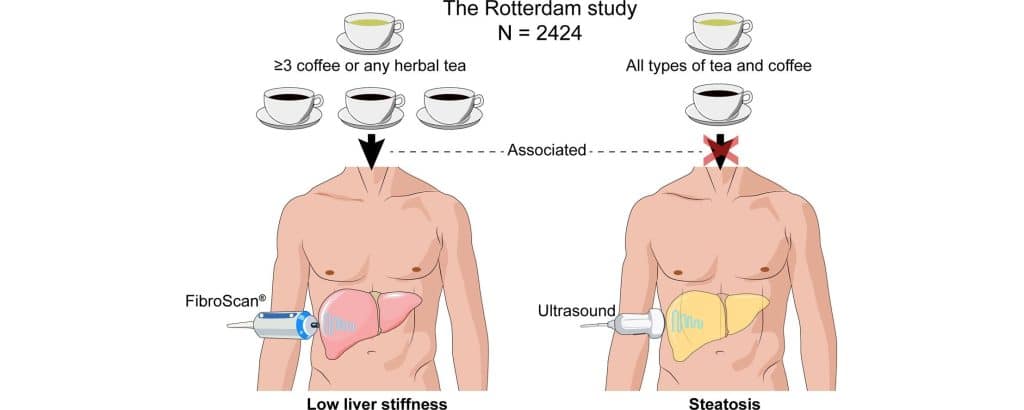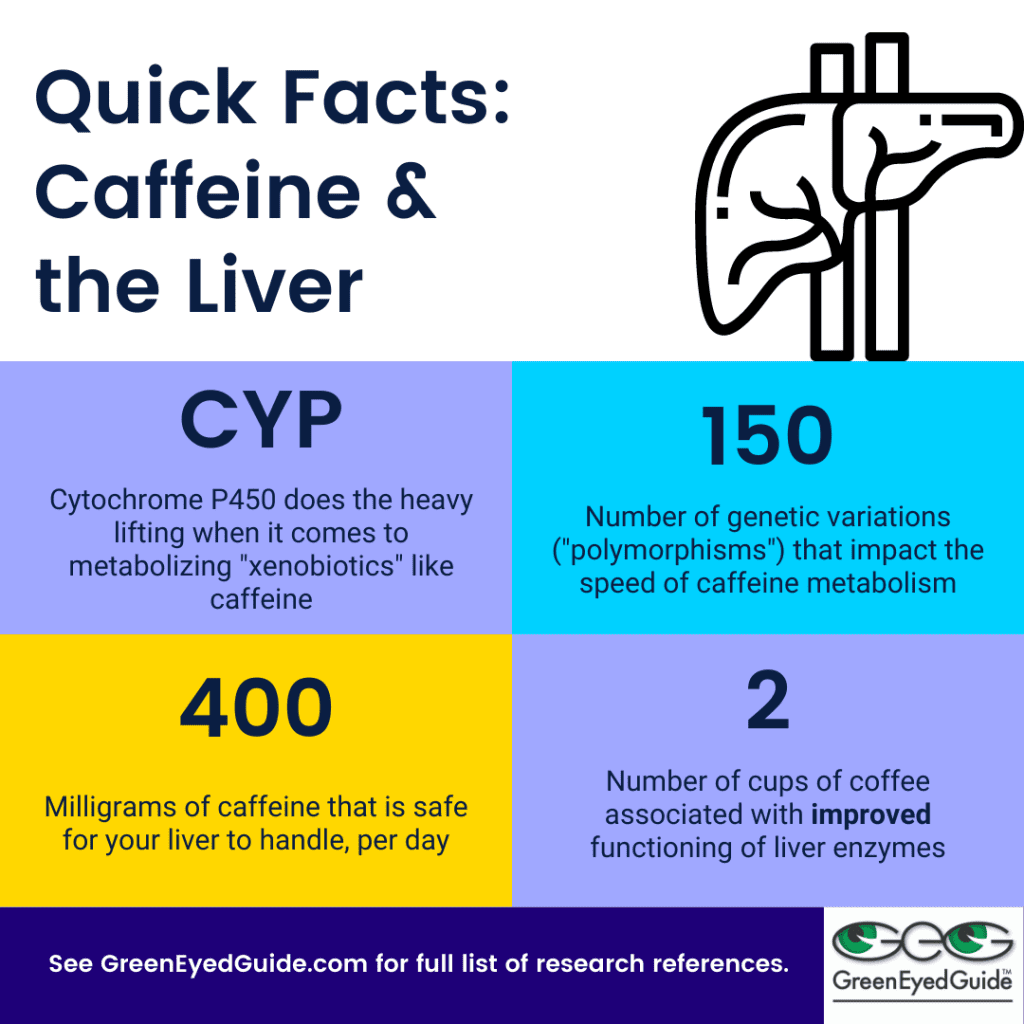Coffee is a beloved beverage millions worldwide enjoy, but have you ever wondered if it impacts your liver?
This article highlights the relationship between coffee consumption and its potential effects on this vital organ.
Delving into scientific research and expert opinions, we will explore coffee’s potential benefits, risks, and overall impact on your liver health.
So grab your favorite mug, sit back, and let’s uncover the truth about coffee and its impact on the liver.
How does coffee affect liver health?
Mechanism of action
Coffee contains various bioactive compounds, including caffeine, chlorogenic acids, and polyphenols, which have been found to confer potential protective effects on the liver. The exact mechanism of action is still not fully understood.
Still, studies suggest that these compounds may help reduce inflammation and oxidative stress, inhibit the development of fibrosis, promote liver regeneration, and even have anti-cancer properties.
Effects on Liver Inflammation
Inflammation in the liver can lead to severe conditions such as hepatitis and liver fibrosis.
Several studies have found that regular coffee consumption is associated with lower levels of liver inflammation markers, suggesting that it may help reduce inflammation in the liver.
This anti-inflammatory effect of coffee is believed to be due to its ability to suppress pro-inflammatory cytokines and activate anti-inflammatory pathways.
Effects on liver fibrosis
Liver fibrosis results from repeated liver damage and can progress to cirrhosis if left untreated. Research has shown that coffee intake is inversely associated with the development and progression of liver fibrosis.
The anti-inflammatory and anti-fibrotic properties of the bioactive compounds in coffee are thought to contribute to this protective effect.
Effects on liver cirrhosis
Cirrhosis is a late-stage liver disease that replaces healthy liver tissue with scar tissue. While coffee cannot reverse cirrhosis, it may play a role in preventing its progression.
Studies have indicated that regular coffee consumption is associated with a lower risk of developing cirrhosis, especially in individuals with chronic liver disease such as hepatitis C.
Effects on liver cancer
Liver cancer is one of the leading causes of cancer-related deaths worldwide. The potential protective effect of coffee against liver cancer has been a topic of interest.
Research suggests that coffee consumption is associated with a reduced risk of liver cancer, and it may be due to the ability of coffee compounds to inhibit carcinogenesis, reduce oxidative stress, and promote cell apoptosis.
Effects on liver enzyme levels
Elevated liver enzyme levels are often indicators of liver damage or disease. Some studies have shown that coffee consumption is associated with lower levels of liver enzymes, such as alanine aminotransferase (ALT) and aspartate aminotransferase (AST). This suggests that coffee may positively impact liver health by reducing liver enzyme elevation.
Effects on liver fat accumulation
Non-alcoholic fatty liver disease (NAFLD) is a condition characterized by fat accumulation in the liver. It is often associated with obesity and metabolic syndrome. Research has found that coffee intake is associated with a lower risk of developing NAFLD and may help reduce hepatic fat accumulation. The exact mechanisms underlying this effect are still being studied.
Effects on Liver Regeneration
The liver has remarkable regenerative abilities; studies have shown that coffee may enhance this process. Coffee consumption has been associated with increased liver volume, suggesting it may promote liver regeneration. The presence of bioactive compounds in coffee, such as caffeine, may stimulate liver cell growth and repair.
Effects on liver diseases
Coffee consumption has reduced the risk of several liver diseases, including hepatitis, primary sclerosing cholangitis, and primary biliary cirrhosis. While the exact mechanisms behind these protective effects are not fully understood, coffee compounds’ anti-inflammatory and antioxidant properties are believed to play a role.
Effects on Liver Transplantation
Liver transplantation is often necessary for individuals with end-stage liver disease. Studies have shown that coffee consumption may have a beneficial effect on liver transplant recipients. It has been associated with improved graft survival and reduced complications after transplantation. However, more research is needed to understand coffee’s impact on liver transplantation outcomes fully.
What are the potential benefits of coffee for the liver?
Protection against liver cancer
Several studies have suggested that coffee consumption may lower the risk of developing liver cancer.
The bioactive compounds in coffee, particularly caffeine and chlorogenic acids, have been found to have anti-carcinogenic properties and may inhibit the growth of liver cancer cells. However, it is essential to note that other lifestyle factors, such as alcohol consumption and obesity, can also influence the risk of liver cancer.
Reduction in liver disease risk
Regular coffee consumption has been associated with a reduced risk of liver diseases, including liver fibrosis, cirrhosis, and non-alcoholic fatty liver disease. The potential protective effects of coffee on these conditions are likely due to its ability to reduce inflammation, inhibit fibrosis, and promote liver regeneration.
Prevention of non-alcoholic fatty liver disease
Non-alcoholic fatty liver disease is closely linked to obesity and metabolic syndrome. Studies have shown that coffee intake is associated with a lower risk of developing NAFLD.
The exact mechanisms are not fully understood, but coffee’s anti-inflammatory and antioxidant properties may play a role in preventing the accumulation of fat in the liver.
Improvement in liver enzyme levels
Elevated liver enzyme levels, such as ALT and AST, are often liver damage or disease markers. Some studies have found that coffee consumption is associated with lower levels of liver enzymes, indicating a potential improvement in liver health.
However, it is essential to consult with a healthcare professional to determine the underlying cause of elevated liver enzymes and to address any concerns.
Are there any potential risks or adverse effects?
Impact of Excessive Coffee Consumption
While moderate coffee consumption is safe, excessive intake may adversely affect liver health.
High caffeine intake can increase the risk of liver damage, especially in individuals with existing liver conditions. It is recommended to consume coffee in moderation and consider individual tolerance levels.
Interaction with liver medications
Coffee, particularly its caffeine content, can interact with certain liver medications. It may interfere with the metabolism and effectiveness of medications such as acetaminophen and some antibiotics.
If you are taking any liver medications, it is essential to consult with your healthcare provider or pharmacist to understand any potential interactions.
Effects of adding sugar or artificial additives
Coffee is a relatively low-calorie beverage, but adding sugar, cream, or artificial additives can significantly increase its calorie and sugar content.
Excessive consumption of sugary coffee beverages may contribute to weight gain and an increased risk of developing conditions such as NAFLD. Opting for healthier alternatives such as unsweetened black coffee or using natural sweeteners can help mitigate these risks.
How much coffee is safe to consume?
Recommended daily intake
Moderate coffee consumption is generally considered safe for most individuals. The Dietary Guidelines for Americans recommends a daily intake of up to three to five eight-ounce cups of coffee, typically providing around 300-400 mg of caffeine.
However, it is essential to consider individual factors, such as sensitivity to caffeine, overall health, and any existing liver conditions, when determining an appropriate and safe coffee intake.
Individual variations
Individuals may vary in their tolerance to caffeine and the effects of coffee on their liver health. Some people may be more sensitive to caffeine and experience adverse effects even with moderate consumption.
Listening to your body and adjusting your coffee intake is essential. If you have any concerns about your liver health, it is recommended to consult with a healthcare professional for personalized advice.
Are certain types of coffee more beneficial?
Regular coffee vs. decaffeinated coffee
Both regular and decaffeinated coffee have shown potential benefits for liver health. Many studies have focused on regular coffee due to its caffeine content, but decaffeinated coffee has also been associated with reduced risks of liver diseases. Therefore, individuals who prefer to limit their caffeine intake can still benefit from decaffeinated coffee.
Black coffee vs. coffee with milk or cream
Black coffee, without added milk or cream, contains minimal calories and is generally considered the healthiest option.
Adding milk or cream can increase the calorie and fat content of the beverage. While moderate consumption of coffee with milk or cream is unlikely to impact liver health significantly, individuals with specific dietary restrictions or concerns about their weight should consider the potential effects of these added ingredients.
Influence of brewing method
Different brewing methods, such as drip brewing, espresso, French press, and cold brew, may result in variations in the composition and bioactive compounds of coffee.
However, limited research specifically examines the influence of brewing methods on liver health. While it is unlikely that the brewing method would drastically alter the potential benefits of coffee for the liver, further studies may shed more light on this aspect.
Presence of other bioactive compounds
Coffee contains numerous bioactive compounds besides caffeine, such as chlorogenic acids and polyphenols, which may contribute to its potential benefits for liver health.
These compounds have antioxidant and anti-inflammatory properties, which are thought to play a role in protecting the liver. Therefore, consuming coffee in its natural form, without additives or artificial flavors, may offer the most beneficial effects.
What individual factors can influence the effects?
Genetics
Individual genetic variations may influence how coffee compounds are metabolized and their effects on liver health.
Genetic factors can determine the rate at which caffeine is broken down and the individual’s susceptibility to liver damage or disease. Further research is needed to fully understand the interplay between genetics, coffee consumption, and liver health.
Overall diet and lifestyle
While coffee may benefit liver health, it is essential to consider the overall diet and lifestyle factors that can affect liver health.
A balanced diet, regular physical activity, avoiding excessive alcohol consumption, and maintaining a healthy weight all support liver health. Coffee consumption should be seen as part of a holistic approach to liver health rather than a standalone solution.
Existing liver conditions
Individuals with existing liver conditions should approach coffee consumption with caution and consult with their healthcare provider.
Liver diseases like hepatitis, cirrhosis, or liver cancer may require specific dietary restrictions, including limiting coffee intake. Following medical advice and recommendations tailored to individual liver conditions is essential.
What do the studies and research say?
Clinical trials and observational studies
Numerous clinical trials and observational studies have investigated the relationship between coffee consumption and liver health.
While many of these studies have found associations between coffee intake and reduced risk of liver diseases, more randomized controlled trials are needed to establish a cause-and-effect relationship and better understand the optimal dosage and duration of coffee consumption for liver health benefits.
Meta-analyses and systematic reviews
Meta-analyses and systematic reviews provide a comprehensive analysis of multiple studies on coffee and liver health.
These studies have generally confirmed the potential benefits of coffee, such as reduced risk of liver cancer, liver fibrosis, and cirrhosis. However, the limitations of individual studies, such as variations in study design and participant characteristics, should be considered when interpreting the results of these reviews.
Conflicting findings and limitations of research
While most studies suggest a potential beneficial effect of coffee on liver health, there are also some conflicting findings.
The complex nature of liver diseases, individual variations, and limitations in research methodologies can contribute to these inconsistencies.
It is essential to consider the evidence and consult with healthcare professionals when making decisions about coffee consumption and its potential effects on liver health.
Conclusion
Coffee consumption has been associated with potential benefits for liver health, including protection against liver cancer, reduction in liver disease risk, and improvement in liver enzyme levels.
The bioactive compounds in coffee, such as caffeine and chlorogenic acids, are believed to contribute to these effects by reducing inflammation, inhibiting fibrosis, and promoting liver regeneration.
However, individual factors, such as genetics, diet, lifestyle, and existing liver conditions, can influence the effects of coffee on liver health. Moderation and individual considerations are essential when it comes to coffee consumption.
It is essential to consult healthcare professionals for personalized advice and prioritize a balanced and healthy lifestyle for overall liver health.









































